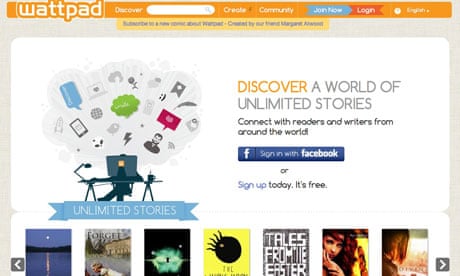Once again people are giving me strange looks. Why Wattpad? And, indeed, what pad? Wattpad, as in wattage, the kind that makes the lights turn on. "But Margaret," you can hear them whispering. "You're a literary icon at the height of your powers; it says so on your book covers. Why are you sneaking out with an online story-sharing site heavy on romance, vampires and werewolves? You should be endorsing Literature, capital L. Get back up on that pedestal! Strike a serious pose! Turn to stone!"
Maybe my dates with Wattpad are a bit undignified. But at my age you can afford to be undignified. You're free to explore, and to guinea-pig yourself, and to stretch the boundaries.
On www.wattpad.com – using your computer, tablet or phone – you can post your own writing. No one need know how old you are, what your social background is, or where you live. Your readers can be anywhere. And if you're worried about adverse reactions from your teachers, your grandmother, or others who might not like you writing about slavering zombies or your relatives, you can use a pseudonym. You can be FlamingLeprechaun and represent yourself with a picture of a bat or a spoon: the internet lends itself to surrealism. Then you can post stories about Pod People or affairs with smouldering hunks undead for 2,000 years, which beats "My Summer Holiday" every time. Not only that, you'll have readers who leave encouraging comments on your message board, thus boosting your morale.
Think of the outlets young writers of my generation had at our disposal. We put together little booklets with our writing in them – our handwriting – for a readership of two: our parents. We went on to place an ill-advised poem or story in the school yearbook, to the secret derision of our classmates. We had to use our real names, which meant that many of us hid our most heartfelt writing in our sock drawers. Some of us later created literary magazines cranked out on mimeo machines and sold in early 60s coffee houses during Poetry Night, after our angst-fuelled readings of our own left-handed works. We were not at the height of our powers.
Wattpad was started in 2006, before the tsunami of ebooks. Everything on the site is free. Over six years, it built itself up under the radar of the traditional publishers, and it now has a membership of millions, in 25 languages, with 1.7bn minute views per month. Increasingly, publishers and music companies are looking at it as an aid to promotion. (For instance, the Wattpad One Direction launch has been viewed by 1 million, and has generated 12,000 pieces of fan fiction to date.) They're also talent-spotting on it, and some Wattpad writers have already moved over to other, more traditional, paid methods of publication.
We hear a lot these days about two ideas. First, that young people aren't reading, but are playing video games instead. However, you don't get that impression from Wattpad, possibly because the site emulates features of video games: participation. Like Dickens during his serial publication of Pickwick, Wattpad writers get feedback from readers, and may shape their stories accordingly.
The second idea is that traditional publishing is doomed. I don't think that's true either. Publishers bring a lot to the joint venture that is producing a book. Not everyone wants to read those kinds of books, and not everyone wants to write them – but they remain a huge aspiration for many. For those who want to hone their writing skills, schools and tools are increasingly available. In my view, Wattpad is not a replacement for publishers, but a gateway leading to them.
But shouldn't writers get paid for their work? In an ideal world, yes. However, though $1.99 – standard for a shortform ebooklet – is low in western terms, it's a prohibitive amount elsewhere. And how can you pay online if you don't have a credit card?
Our generation in the west was lucky: we had readymade gateways. We had books, paper, teachers, schools and libraries. But many in the world lack these luxuries. How do you practice without such tryout venues? Without a piano, how do you learn to play the piano? How can you write without paper and read without books?
I got into trouble a while ago for saying that I thought the internet led to increased literacy – people scolded me about the shocking grammar to be found online – but I was talking about fundamentals: quite simply, you can't use the net unless you can read. Reading and writing, like everything else, improve with practice. And, of course, if there are no young readers and writers, there will shortly be no older ones. Literacy will be dead, and democracy – which many believe goes hand in hand with it – will be dead as well.
Allen Lau, the co-founder of Wattpad, remembers getting a letter from an old man in a village in Africa. The village had no school, no library, no landline, and no books. But it had a mobile phone, and on that they could read and share the Wattpad stories. He was writing to say thank you.
So that's why I'm judging the Wattpad poetry contest. Wattpad opens the doors and enlarges the view in places where the doors are closed and the view is restricted. And somewhere out there in Wattpadland, a new generation is testing its wings.
Margaret Atwood is creating a WattCave comic strip, at www.indiegogo.com/fanado. Her own suite of poems on Wattpad can be found at http://www.wattpad.com

Comments (…)
Sign in or create your Guardian account to join the discussion